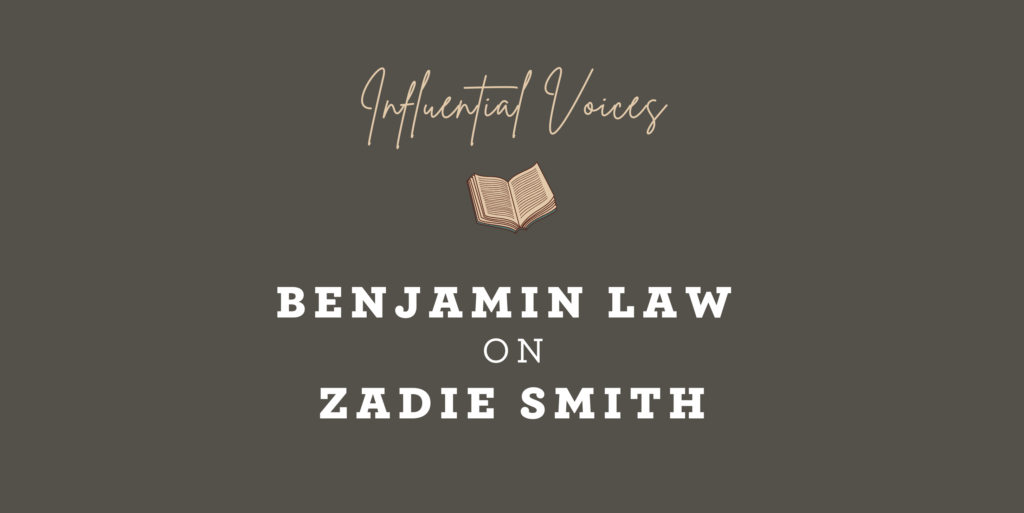
So let’s get this out of the way: Zadie Smith is a babe. And I say this as a bona fide homosexual who generally abhors focusing on someone’s physical appearance over their intellectual smarts — but hey, you know, Zadie: phwoar. Straight male friends of mine have tried reading Smith’s novels, only to face constant distraction from her back-cover author shot. And while I like to give people the benefit of the doubt, I suspect this is one reason (of a few) why some people don’t like Zadie Smith. That’s a shame. She is an excellent writer. Who happens to be smoking hot. Don’t hate her because she’s beautiful. But enough about that. Let’s move on.
In the summer holidays between 2001 and 2002, I was between semesters from my undergrad writing degree. My mum and youngest sister were overseas visiting extended relatives, and I’d come back to the family home to housesit and work at my dad’s restaurant at night. After working a late shift with dad, he’d drive me back to Mum’s place and I’d spend the rest of the evening scouring grease from my hair before climbing into Mum’s bed and reading a novel.
It was weird being in that big, quiet house all alone, but the first book I read made it feel as though the entire world had opened up to me. It was Zadie Smith’s White Teeth — a sprawling, loud London novel with stupid amounts of energy. It’s one of those miraculous books that seems to feature 497,102 characters, each of them so utterly vivid and distinct that you’re able to, somehow, easily keep track. Looking back, it’s not a perfect novel (who likes perfect novels?) but I liked it a lot.
Everyone knows the story behind White Teeth — Young Black British Writer Gets Obscenely Huge Advance on Back of 80-Page Sample at Age 24 — and it’s probably more famous than the novel’s plot itself. Most reviews fawned over it, except for one memorably vicious piece published in the British arts magazine Butterfly. ‘This kind of precocity in so young a writer,’ the reviewer wrote, ‘has one half of the audience standing to applaud and the other half wishing […] she would just stay still and shut up.’ When I saw that the reviewer was Zadie herself, I think I sort of fell in love.
There is something about Smith’s writing — her attitude; her way of seeing people — that just gets me. I could talk about other writers in Smith’s generation I adore — Dave Eggers; Chimamanda Ngozi Adichie; Jonathan Safran Foer; Gary Shteyngart — who arguably do more cutting-edge work. But what I love about Smith is her perspective, and a love for her characters that shows people (including herself, in her non-fiction) doing reprehensible things, but in ways we understand. In her essays, her constant doubt — over big trends, people, politics, herself — appeals to me. I like people who are articulately unsure of things. There is a reason her collection of essays is called Changing Your Mind.
There’s her dialogue too. Whether it’s an old British man named Archibald, or a black, mixed-race ghetto wannabe named Levi, Smith is almost creepy with her literary ventriloquism.
Smith’s preoccupations are often the things I look for in writing — the weirdness of family; the never-ending, profound embarrassment that comes with simply being yourself — and the convergence of those things in her novel On Beauty just killed me. A smart book about academia, family and the weird dichotomy of left-right politics, it was also just very funny. But as the title implies, there were moments of true beauty too. One sequence sees a trio of siblings running into each other, unplanned, on a busy street, that was magical to read. Maybe it’s only a feeling that would resonate with people from bigger families like myself. In fact, I loved that scene so much I used it as the epigraph of my book.
Above all, Smith is generous, not just to characters but to readers. She writes essays and lectures on complicated ideas, but also reviews shocking films like Date Movie and interviews Eminem. She doesn’t separate high and low culture, because they’re all a part of one world in which she’s engaged, one where everyone is constantly straddling different race, class and education backgrounds. Plus, she has terrific quotes. ‘To look back at all past work induces nausea,’ she once wrote, and it heartens me to hear a writer like her feels similarly gross about their own work. Part of me likes to think Zadie Smith and I could be spew buddies. If I’m honest, maybe I’m hoping some of her glamour would rub off on me, as she holds my hand in the gutter.
About the Writer
Benjamin Law is based in Brisbane. He writes regularly for frankie and Qweekend, and has been published in The Monthly, Sunday Life, The Big Issue, Crikey, New Matilda, ABC Online, Overland and The Walkley Magazine. His books include The Family Law, Gaysia and Quarterly Essay: Moral Panic 101.
More from Writing NSW
Check out our full range of in-person writing courses in Sydney, our online writing courses and our feedback programs to see how we can help you on your writing journey. Find out about our prizes and opportunities, as well as writing groups across NSW, and sign up to our weekly newsletter for writing events, opportunities and giveaways.
